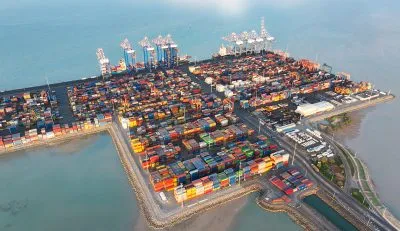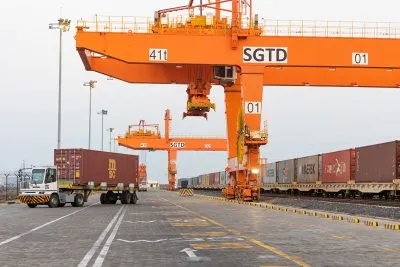Every Friday morning, the Sheraton Djibouti Hotel offers its guests a boat trip to Moucha Island, some fifteen kilometres off the coast of the capital. “With this destination, there is no need to envy the Maldives or the Seychelles,” enthuses Emmanuel Riggi, the manager of the hotel, which has been operating in the country for 42 years.
Yet few tourists in the world are aware of the existence of the island’s fine sand, turquoise water, coral reefs and richly diverse seabed. It has to be said that its tourist infrastructure is underdeveloped. “Generally speaking, the country has enormous potential, which has not yet been exploited to the full,” laments the hotelier.
This is the challenge facing the Djibouti government, which wants to improve the country’s attractiveness in order to diversify its economy, which is still largely dependent on port activity. “Our goal is to welcome 500,000 tourists by 2035, compared with around 140,000 today. It’s an ambitious target, and the pandemic has slowed us down, but we’re still hopeful,” explains Osman Abdi Mohamed, Managing Director of the Djibouti National Tourist Office.
“To achieve this, we need to strengthen our infrastructure at tourist sites, with access to water and electricity, and develop beach and land transport, possibly through a public-private partnership.”
Far from mass tourism, the country intends to capitalise on its marine and terrestrial biodiversity, consisting of plains, mountains, lakes, plateaux, mangrove areas, beaches and islands. One of the country’s jewels is Tadjourah Bay, where dozens of whale sharks congregate from October to January.The country is already renowned for its scuba diving.
Another point in favour of promoting tourism in this country, which is host to five foreign military bases, is its reassuring security environment, in a region that is regularly plagued by conflict. The country’s inhabitants are proud to say that it is possible to walk the streets of Djibouti at any time of the day or night. ‘We don’t have a heritage location like the Eiffel Tower or the Cheops Pyramid. Our model is based on the protection of natural sites. We’re aiming for a niche tourism sector that cares about its environment,” says Mohamed.
While the sector currently contributes 3% of GDP, the government hopes to double this figure by 2035. To achieve this, the Director General of the National Tourist Office highlights the measures put in place in recent years to promote tourism, such as lower visa prices since 2019, as well as the possibility of obtaining the documents digitally. “With the support of international experts, the government has also set up a new training centre for the hotel trade,” he adds.
More hotel units needed
On the infrastructure side, the airport has already undergone extension and refurbishment work, with a view to improving its operational capacity. The government is also conducting a feasibility study into the construction of a new airport, with a view to
positioning the city as an airport hub in the long term.
Another positive sign is the inauguration of the 5-star Ayla hotel in early March 2024, located on the capital’s seafront. Built by private Emirati operator Sheikh Nahel for around $200 million, it has a capacity of 217 rooms and can host international conferences. The businessman is well known in the country for having invested in the Kempinski hotel, the Bawadi Mall shopping centre and around thirty villages in Haramous, a residential area of the capital.
However, there is still a long way to go to achieve the targets set for 2035. While the sector currently has 44 hotels with a total of 1,814 rooms, not all of them match the standard targeted by the government’s strategy.
“We would need to build between 12 and 15 hotel units to be able to meet the needs of 500,000 tourists,” calculates Slim Feriani, CEO of the Sovereign Wealth Fund of Djibouti, who describes the typical tourist as “essentially a business tourist who spends two, three or four nights in Djibouti.” In his view, the imbalance between supply and demand contributes to the high prices charged by businesses.
What’s more, the country is struggling to recover its pre-pandemic visitor numbers. In 2023, the country welcomed 142,551 tourists, 25,000 fewer than in 2019, at a time when the global tourism industry had not yet been weighed down by the health crisis. “There’s still a lot to be done, but the potential is enormous. You just have to come here to see the opportunities,” Feriani continues.
Great potential for tourism
To get things moving, the national private sector also has its part to play. Businesswoman Hibo Bacha is well aware of this. She regularly travels to international trade fairs to promote her country. “When people ask me what Djibouti looks like, I tell them about the whale sharks that gather every year in the Gulf of Tadjourah. I describe Lake Assal, an immense expanse of salt that lies 150 metres below sea level. Or Lake Abbe, which resembles the planet Mars, with red sand and warm water rising from the earth. I’m also talking about the Seven Brothers archipelago, a coral reef where you can go diving,” explains the founder of Bacha Travel, an agency with a good reputation in the capital of Djibouti. “Our country has great tourist potential, but what we lack is infrastructure. We need to find investors to sell the destination,” she says.
The Managing Director of the Kamaj Group, Houssein Mahamoud Robleh, who operates in real estate, distribution, security, hotels and transport, would also like to change the face of national tourism. “It’s a good thing to have big hotels in Djibouti city, but now we need to build extensions to get to the tourist sites. The road going to Lake Abbe is very poor, for example, and this is holding back the development of infrastructure there,” says this businessman, owner of the Les Acacias Hotel, located on the seafront in the Heron residential district of the capital.
To enable travel to sites such as Lake Abbe in record time, the businessman is considering offering helicopters for hire-purchase, in partnership with international operators. In the meantime, he is finalising the construction of a stopover gîte at As-Eyla. “The idea is to get up very early to see the lake at sunrise, with flights of pink flamingos,” he says.
Full of ideas, the entrepreneur is also building bungalows and a restaurant on Maskali, the neighbouring island of Moucha, off the coast of the capital. At the same time, he is developing the seafront of his hotel overlooking the Gulf of Aden. “The development of responsible tourism can enable us to develop our regions and redistribute wealth more effectively. We need to create jobs, because unemployment is high, especially among young people. The idea is to create an endogenous economy. There’s a lot to be done, particularly in terms of road infrastructure, because we’re in a country that’s still in its infancy,” he says.
A lack of international visibility
To develop its tourism sector and meet the objectives of Vision 2035, the country will also need to raise its profile internationally. “In Europe, nine out of ten people don’t know where Djibouti is on a map, and others think it’s a military garrison. People don’t see Djibouti as a tourist destination. In fact, only 10% of our customers are ‘holiday’ tourists, which is also linked to the limited number of flights available and the high price of tickets,” says Riggi of the Sheraton, which has 185 rooms and 226 employees.
“Another problem is the high cost of products, because everything is imported. In a Sheraton in Abu Dhabi, you pay 120 dollars a night, here it’s 230 dollars for the first price. As an example, I pay a million dollars a year for electricity. It’s one of the most expensive kWh costs in the world.”
However, this sector specialist is convinced: “The tourism sector can bring a huge windfall of jobs to the country, both directly and indirectly. But everyone needs to be moving in the same direction, all at once, to build roads, canvass customers and develop skills in the catering trade. We need investors with solid backing to set up things that won’t be profitable for several years. We need to be able to create supply to attract demand, because 2035 is tomorrow.”
Want to continue reading? Subscribe today.
You've read all your free articles for this month! Subscribe now to enjoy full access to our content.
Digital Monthly
£8.00 / month
Receive full unlimited access to our articles, opinions, podcasts and more.
Digital Yearly
£70.00 / year
Our best value offer - save £26 and gain access to all of our digital content for an entire year!

 Sign in with Google
Sign in with Google 



